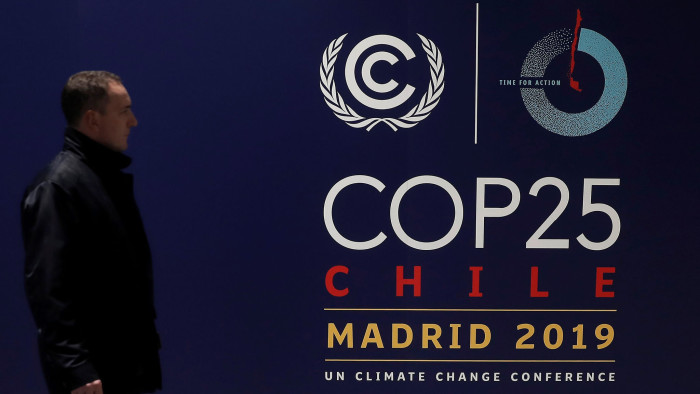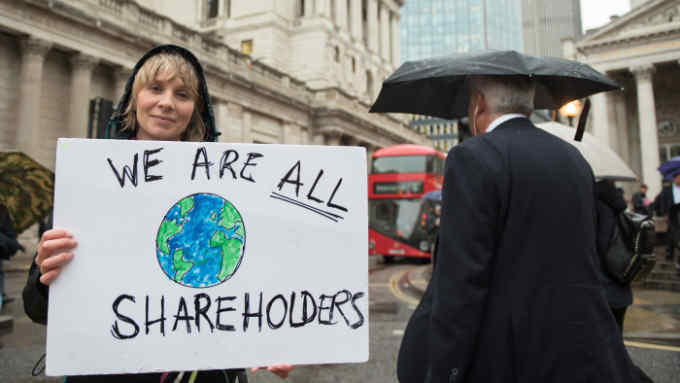Davos prioritises environment as activists invest hope in greener finance


Roula Khalaf, Editor of the FT, selects her favourite stories in this weekly newsletter.
“Our house is on fire,” Greta Thunberg told delegates at the World Economic Forum last January. In the months that followed, “Greta” became the uncompromising spokesperson for a global movement.
Last September’s series of co-ordinated international street protests demanding action on climate change were among the largest the world has seen. Mother nature provided the backdrop: climate events in 2019 — flooding in the US Midwest, Hurricane Dorian in the Caribbean, firestorms in Australia — could hardly have been more extreme.
Hardly surprising, then, that concern about climate change is among the top agenda items at the WEF this year. Davos is not alone. Almost all the world’s leading central banks — the US Federal Reserve is one exception — have come out in favour of a greening of finance. Asset managers are loading portfolios with sustainable investments. In Europe, at least, not to have a climate agenda marks you as belonging to the political fringe. Ursula von der Leyen won the presidency of the EU Commission offering a “Green Deal for Europe”. In the US, 2019 was the year climate politics reconquered the Democratic party.
But this heightened awareness stands in contrast to the latest International Energy Agency report on energy use and emissions. Though rising, renewables cover only a small share of world energy needs. China and India are reducing the carbon intensity of their economies but their progress in efficiency and decarbonisation is trumped by their rapid economic growth. Transport, industry and our poorly insulated and cooled buildings continue to belch out carbon dioxide. As extreme weather hits, we turn up the heating and air conditioning.
A powerful current of politicised climate denial contributes to this cognitive disconnect and not just in the US. Brazil’s foreign minister, Ernesto Henrique Fraga Araújo, reportedly sees global concern for the Amazon as a Marxist plot. At last year’s annual UN climate conference, COP25 in Madrid, the US, Brazil, Australia and Saudi Arabia joined forces to block forward movement on a global carbon market. Their demand that carbon credits left over from the 1997 Kyoto agreement should count towards 2030 targets outraged other delegations.

The best that can be said is the series of climate talks goes on. The world meets again in November, at COP 26 in Glasgow, hopefully to renew and improve pledges made at Paris 2015 to reduce greenhouse gas emissions.
The targets that national governments announced at Paris were for emissions reductions to be achieved by 2030. They were supposed to put the world on course for no more than 2 degrees of warming. But even if the Paris pledges are met, scientists tell us that those commitments are far from adequate. The most likely scenario is that they will result in long-run warming in excess of 3 degrees, which has catastrophic implications.
The truth is that the much acclaimed Paris agreement was an inadequate fudge. Its chief justification was that an agreement was better than no agreement and that subsequent talks would yield more adequate commitments. That is why Glasgow COP26 is so crucial. Only if the new commitments made there promise much deeper decarbonisation will the gamble at Paris be vindicated. If they fall short, the bankruptcy of the entire process will be exposed.
The bar is high. To meet a goal of no more than 2 degree warming, the UN Environment Programme estimates the pace of cuts needs to be three times steeper than that promised at Paris.
Nothing of the sort is likely from the coalition of the unwilling that showed its hand in Madrid, led by the US and Brazil. Even climate activists like the Europeans are having difficulties. Poland insists that it must be paid to abandon its coal mines. Germany is rich enough to compensate its own miners but its hasty 2011 decision to accelerate the shutdown of nuclear puts it at odds with a France that has been deeply committed to nuclear power since the 1970s. Germany’s investment in renewables is stalled by nimbyism. The UK, at least, is making progress in decarbonising the electricity supply. It helps that Margaret Thatcher won her war against the miners in 1985 and also that Britain can build its windmills offshore.
In the global balance of emissions none of the individual European countries matters much. They will matter less with time but European leadership is crucial. Not only will the UK host COP26 but by the time the world convenes in Glasgow, the chances are the US will no longer be a party to the accords. Its exit from the Paris agreement will become final on November 4, the day after this year’s US presidential elections, with Donald Trump presently the favourite to win.
Without the US, the Glasgow outcome depends on agreement between China and the EU, the number one and number three world polluters. They meet for a bilateral summit in September. Given the slow process of reaching agreement within the EU, Brussels has precious little time to bridge its internal divisions. It is vital it does so, because Beijing is showing signs of backsliding. Faced with slower economic growth and rising trade tensions with the US, a retreat to heavier reliance on domestically sourced coal looks more attractive to China than it did in 2015. Without a Sino-EU deal, the chances are slim of Glasgow producing the needed commitments to emissions reductions.
All this puts global elites’ passion for green finance in a different light. The enthusiasm for sustainable assets is not just a matter of responsible investing. For activists, the hope is that it offers a way past the political gridlock.
If the price of renewables and battery storage continues to fall at its current rate then, even without a tightening of environmental legislation, the most polluting sources of power will be driven off by market pressure.
Decarbonising heavy industrial processes like steel smelting, electrifying transport and upgrading the vast stock of badly insulated buildings continue to pose huge challenges. But if the technologies are cheap and capital markets willing, the politicians’ choices will be far easier.
It is a vision likely to appeal to Davos. But 2020 may reveal whether hopes pinned on technology and markets will amount to a counsel of despair in the face of contentious politics.

Comments